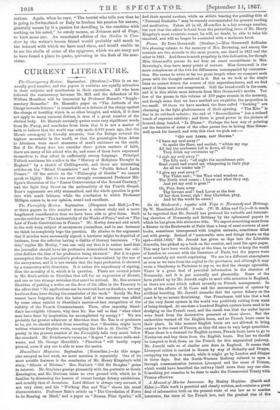On the Boulevards; together with Trips to Normandy and Brittany.
By W. Blanchard Jerrold. 2 vols. (W. H. Allen and Co.)—It is much to be regretted that Mr. Jerrold has prefaced his valuable and interest- ing sketches of Normandy and Brittany by the ephenieral papers to which be has given this attractive title. We expect something more from a &Wear on the Boulevards of Paris than a heap of semi-reviews of new books, sometimes interspersed with longish extracts, sometimes filled out with gossip. Instead of "memorable men and things drawn on the spot-1853-1866," Mr. Jerrold has given us dips into the Librairie Nouvelle, has picked up a book on the counter, and read the open pages. This may have been worth doing at the time, in order to keep the world of London an courant with the literature of Paris, but the papers were
most certainly not worth reprinting. We are in a different atmosphere
as soon as we turn from the capital to the provinces, and although it may seem a blasphemy to Parisians to say so, we find the change agreeable. There is a great deal of practical information in the sketches of
Normandy, and it is put naturally and pleasantly. Some of the facts picked np by Mr. Jerrold ought to meet with attention in England, as there are some which reflect severely on French management. In- spite of the efforts of M. Coate and the encouragement of oysters by artificial breeding, Mr. Jerrold remarks that the oyster fishery on the coast is by no means flourishing. One Frenchman told him that a bed of the very finest oysters in the world was positively rotting from want- of being dredged. At one time a hundred English oysters boats used to be dredging on the French coast, and the result was that the under layers were freed from the destructive pressure of those above. But the authorities warned off the English boats, and no French boats came in their place. In like manner English boats are not allowed to bring oysters to the coast of France, as they did once in very large quantities. When there is a demand for English oysters, French boats have to go to Newhaven and buy them from the English boats. But lest we should be tempted to look down on the French for this unpractical jealousy, Mr. Jerrold tells us of similar acts done in England. It seems that Liverpool cotton is carried to Rotten by way of Grimsby and Dieppe,
occupying ten days in transit, while it might go by London and Dieppe, in three days. But the North-Western Railway refused to open a through communication between Liverpool and the coast of France, which would have benefited the railway itself more than any one else. Something yet remains to be done to make the Commercial Treaty witb. France effective.






























 Previous page
Previous page